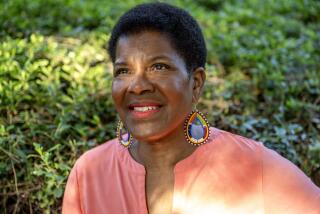Discoveries
- Share via
“FIRST things first. You have to meet my mother.” So begins “The Things Between Us,” Lee Montgomery’s stunning addition to the literature of drunken mothers: Alexandra Fuller’s “Don’t Let’s Go to the Dogs Tonight,” Mary Karr’s “The Liar’s Club,” Carolyn See’s “Dreaming,” to name just a few of the books in the last decade inspired by a generation of wasted matriarchs.
Montgomery’s New England “Mumzy” is a particular hybrid that her daughter describes as “Anne Sexton meets Julie Andrews.” Mumzy begins each day in their Framingham, Mass., home with a Gin Minty, delivered promptly at 8:45, as it has been for decades, by Montgomery’s father. The days unravel accordingly, drink to drink, some of them ending in insults, ranting, flailing and even blood. In many ways, this drama is merely the back story to the author’s pure, sweet love for her father, who is nicknamed Monty.
“The Things Between Us” is set in 1998-99, when Monty, at 76, is diagnosed with stomach cancer. The author flies back and forth from her home in Portland, Ore., to be with him. That time, as is so often the case in the final months a relative spends with a dying family member, is spent looking back over their lives together. “Sometimes, when I think of my family, I imagine a miniature solar system,” Montgomery writes. “We are the earth, the sun, and the moon, and outer planets. Father is the deeply rooted earth. Mother is a hot and fiery sun, big enough to fill up the sky.”
At age 42, Montgomery is homesick for her childhood, and in the haze of that homesickness, things and events are rendered humorous that may not have been to a bewildered child longing for a normal family. Mumzy is not quite as funny as Fuller’s truly crazy British mother and not as mean as See’s more Middle American version, but she is certainly more pathetic than either, couched like a fragile jewel in the New England matrix of emotional distance and the keeping up of appearances.
The author and her two siblings have long since fled the nest. Montgomery has recently moved to Portland from California, where she was for many years the editor of the Topanga Canyon newspaper. As an editor, she has grown accustomed to helping other people make sense of their stories, but she can’t -- try as she might -- make sense of her own. “We can cure certain types of cancer, fly around the world at record speeds, send men to the moon,” she writes, “but it’s impossible to get a drunk not to drink.”
Confronted with the horrendous maternal melodrama, even as her father is dying, Montgomery feels the urge to run. “And in my mind, I do. I run everywhere: through all the rooms, through towns, through years,” landing on memories and snapshots and nicknames and old boyfriends and favorite things and ghostly photographs. The memoir wobbles like a desert mirage, through afternoons spent driving and smoking with her father and recalling things he once said. (“I don’t like California,” he told her when she moved there, “it’s full of fruits and nuts.”)
Other times, she’s rooted to his bedside: “Popalicious is in nowheresville,” she thinks. “For hours over the last months, as I watched him stare, he was busy, preparing for the enormous task of unbuttoning all the buttons, unhooking all the connections and obligations that kept him here.”
These memories have a certain graceful momentum, ending, as we know they will, in her father’s death. However, it is the memories of her mother -- also loving, in their way -- that punctuate the book. They are hard, unresolved, unexplained. “This dying business is about endings, yes,” Montgomery concludes, “but also quite possibly its difficulty carves a tiny space in people’s hearts for something new.”
The alcoholism, though, is final, a defeat that will at best live on in deceptively funny, slightly disingenuous stories in which you can hear the writer, feel the writer, trying hard to make something, anything, out of nothing.
Montgomery has a lovely, straightforward, trustworthy style. You like her utter lack of self-pity. You appreciate the absence of bitterness and judgment. There’s no pretense of offering some grand lesson, other than love: Love as best as you can for as long as you can. That’s all.
More to Read
Sign up for our Book Club newsletter
Get the latest news, events and more from the Los Angeles Times Book Club, and help us get L.A. reading and talking.
You may occasionally receive promotional content from the Los Angeles Times.






